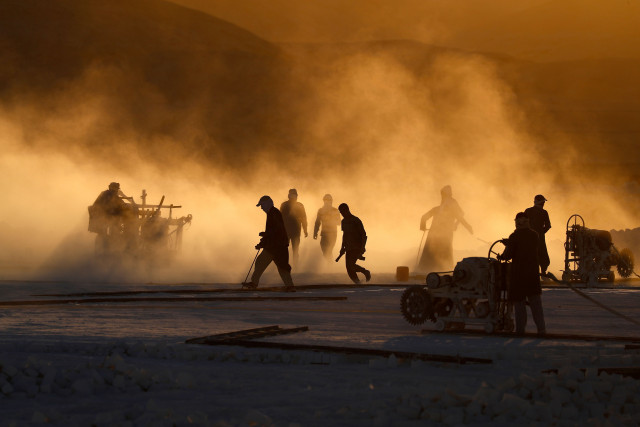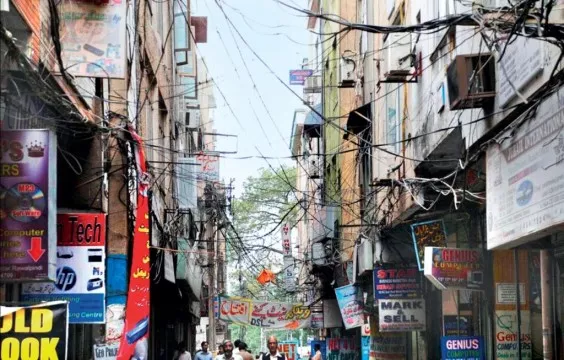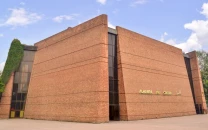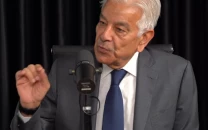A decade of exceptional development and upsets for Punjab
Sharif's party rejects all allegations against his term in office

PHOTO: AFP

For Punjab, the last decade has been eventful, punctuated by the expected and a long list of unexpected upsets. From the change of guard at the helm to massive development projects, the province has witnessed it all.
During this time, the province saw the abdication of Shehbaz Sharif, its longest-serving administrator, following the Pakistan Tehreek-e-Insaaf (PTI) victory in the 2018 election. For much of these ten years, the provincial capital became the hub of all developmental activities. From bridges to a new metro rail project, the Pakistan Muslim League Nawaz (PML-N) administration claimed credit for modernizing the province, but each one of the projects ended up with a slew of corruption allegations by the opposition.
Members of the opposition benches accused the former chief minister and his coterie of financial misappropriation. Every project during his term in office faced the wrath of opposition leaders and intense scrutiny.
The Sharif administration launched projects in health, education, and infrastructure projects. With a 900% increase in the budget, education spending remained a priority for the provincial government. However, the opposition claims the province made no real gains in the sector. Sharif dominated the political arena for much of the past 10 years. He remained the unopposed leader of the province for the longest time.
The biggest challenge for his leadership surfaced in 2014. Supporters of Muhammad Tahir-ul Qadri, a firebrand preacher who vowed to topple the PML-N government in the centre and the province, clashed with the police. Starting in Punjab, the anti-government protests quickly spread across Pakistan, virtually crippling the Sharif government in the province. Punjab instantly transformed into a battleground. Qadri's supporters — some of them armed, others wearing gas masks — challenged the security forces and engaged in a street fight across Sharif's political power base.
Analysts referred to 2014 as an “annus horribilis,” a Latin phrase meaning horrible year, for the chief minister and his cabinet. Opposition parties rallied behind the cleric's call to punish Sharif for the deaths in Model Town. Sharif's survival was in question, but he survived the political storm to serve the remaining portion of his term in office.
1,300 hepatitis cases registered in 11 months
Two of Sharif's flagship public schemes came under fire for financial irregularities. Observers believe Sharif received flak for the low-cost housing scheme for the underprivileged and the Sasti Roti scheme. Accusations of corruption dogged both projects. On the other hand, Sharif managed to make some meaningful investments in the healthcare sector. Medical units across Punjab received upgrades. Some even offered free healthcare services. In public transport, Sharif managed to introduce two solutions. The BRT and the metro bus project become his claim to fame at every rally.
In 2018, the PTI took the reins of power, pushing the PML-N to the opposition benches. With more than 170 seats in the provincial assembly, the PTI managed to cobble a government. According to political observers, the surprise defeat in Punjab, a territory that has served as the home ground for PML-N, has seemingly left the party in the doldrums. Since giving up the treasury benches in the provincial assembly, the PML-N has been butting heads with the PTI administration.
Political analyst Dr. Rasool Baksh Rias looks at the performance of Punjab government with a different lens. According to the analyst, Sharif neglected the health and the education sectors during his time as chief minister. "The former chief minister tried to bring up a parallel system against the bureaucracy, but it failed miserably," said Rias, who is a Professor of Political Science in the Department of Humanities and Social Sciences at LUMS.
Commenting on the projects launched during the PML-N government, Rias said, "The Multan-Sukkur motorway project was good. However, they come under CPEC and the federal government umbrella."
Other mega projects, like the Orange line train, he said, were launched to win the election. While Sharif's successor has earned criticism for having a laidback attitude towards mega development project, analysts believe the PTI administration is focusing on health and education.
"PTI government inherited economic challenges, but they have made considerable investments in the education and healthcare sector," said Rias.
Political analyst believes corruption remains a huge challenge for the province. "Both Sharif and Buzdar failed to control corruption. It plagues every department and every sector," said Rias. "It has consumed our economy like a termite," he cautioned.
Sharif's party rejects all allegations against his term in office. "During the last ten years, Punjab and especially Lahore witnessed development that is in line with international standards," said former minister Mian Mujtaba Shuja-ur-Rehman. "We revolutionised the health and education sectors," the former minister claimed.
Rehman's claims were instantly refuted by PTI leader Mian Mehmoodur Rasheed, who also served as the leader of the opposition. "Development during PML-N government was mostly cosmetic and had no real impact on the lives of the people," Rasheed said.
Published in The Express Tribune, December 30th, 2019.



















COMMENTS
Comments are moderated and generally will be posted if they are on-topic and not abusive.
For more information, please see our Comments FAQ